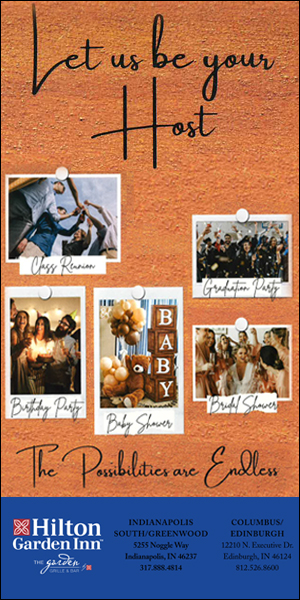The 16th president of Franklin College moves in
By Julie Cope Saetre
»It’s a gray, rainy August morning on the campus of Franklin College, one of many in a record-setting season for precipitation. The faculty-staff summer picnic, scheduled on the grounds later that day, will need to shift inside. It’s not the first such H2O-related obstacle encountered by Thomas J. Minar, the college’s new president, since his arrival on campus June 15. His office has just become open for occupancy after a malfunctioning air-conditioning unit caused water damage.
These are trivial matters for Minar, who shrugged off both his watery welcome and the impending picnic relocation. Representing the Grizzlies well in a navy blue blazer and similarly hued Allen Edmonds shoes with old-gold laces, he’s focused on his new role, which began officially on July 1. His overall goal: “Bring broader success to Franklin College.”
It’s a complex challenge, working with faculty, staff, students, alumni and community leaders locally and in the greater Indianapolis area, but one for which Minar is well-prepared.
Originally from the northern suburbs of Chicago, he worked in Illinois academic institutions for 23 years, including Northwestern University, the University of Illinois at Urbana-Champaign, Chicago Theological Seminary and Roosevelt University. After five years at the latter as vice president for institutional advancement and special assistant to the president, he relocated to take on the role of vice president of development and alumni relations at American University in Washington, D.C.
A Midwesterner at heart, he considers his transition from the nation’s capital to Johnson County as “a celebrated homecoming.” And that includes the bucolic setting of Franklin, even though it would seem to present a drastic change from the fast-paced intensity of Chicago and D.C.
With Indianapolis only 25 miles to the north, Franklin has a unique nature, he explains, retaining the feel and benefits of a small-town college area, but benefiting from the economic impact of the larger city to its north.
“That’s exciting,” he says. “To me, that’s a stimulus for coming to Franklin, Indiana. The growth in this region is really fascinating. And the economic growth and stimulus in the state is a part of the reason to be here. I think that Franklin College and other private institutions of higher education have a real role to play in that. And I want to be part of that. That’s a part of creating change for wonderful people in a wonderful place.”
Minar’s successful track record in development and alumni relations will be a driving force behind that change. At American University, for example, he oversaw the AnewAU campaign, which surpassed its $200 million goal by more than $14 million.
Already Minar has been on the road in his new role as the college’s 16th president, both in and out of the state, meeting with Franklin College alumni individually and in groups. But it’s not a matter of introducing himself and going for “the ask” for donations. Minar wants former Grizzlies to be involved from the heart, whether that means speaking to current Franklin College classes, providing internships, mentoring students or simply attending college events. The dollars, he says, will follow.
“People think that I’m just a fundraiser and that I’m going to focus on the money,” he says. “Money’s a critical part of engagement, and yes, I think alumni should support the institution financially, but it springs forth from the passion that they have for the institution and what we do. And they can’t even have that passion if they’re not somehow engaged and involved.”
It was Minar’s own passion — for liberal arts education, for building internal and external collaborative relationships, for building bridges with the greater Indianapolis area business community — that appealed to Franklin College’s board of directors, said Christi Fields, the board’s chairwoman. That passion, combined with Minar’s energy and enthusiasm, make him “a visionary leader,” she explains.
It’s a sentiment shared by Minar’s former employer, American University President Cornelius M. Kerwin. “Tom has been a transformative leader for American University, building the infrastructure and professionalizing our alumni and development operations across the institution to improve dramatically alumni engagement and philanthropy,” Kerwin said after hearing Franklin College’s announcement of Minar’s hiring.
Such connections and development provide new and enhanced opportunities for students, another keystone in Minar’s vision. Now 51, he looks back fondly on his own undergraduate days at Pomona College, a small liberal arts school in Southern California, where he earned a bachelor of arts degree in government. Pomona enabled him to get to know the professors and administrators, including the president, and benefit from their advice and expertise.
“My Pomona experience, both as a student and an alumnus, really helped shape who I am and my drive to spend the rest of my career in the residential college environment,” he explains. “It affects what I do every day here. It affects my understanding of the importance of interaction with students and with faculty and staff around campus. … I know how much impact we each, as individuals, can have on our students. Every time I walk out onto the mall here, that’s what I think about and that’s what drives me.”
He’s apparently quickly making an impression. Only six weeks into his new role, he was already known and notable among students, Fields said. Some even suggested to her that the college make bow-tie T-shirts in honor of Minar’s trademark neckwear.
He realizes that today’s undergrads face a set of challenges specific to the times. A still recovering economy combined with parental expectations and larger philosophical questions of sustainability on a number of domestic and global fronts can result in student worries both personal and societal.
“Young people are so driven today, and they’re so concerned,” he says. “I think they’re just worried, in a state of anxiety, because of the speed of our environment. They express a lot of that anxiety in their concern for their world. They see folks in a couple of earlier aged cohorts as prosperous and having had lots of opportunity, and they’re concerned about whether they’re going to have the same opportunity for success and prosperity.”
Franklin College, Minar believes, addresses those concerns through formal instruction and what he calls “engaged learning opportunities” — forays beyond the classroom into the students’ fields of choice, whether those encompass the Biological Field Station on the college campus, the political halls of Washington, D.C., or the film studios of Los Angeles.
“We’re determined to take advantage of all of our connectivity to find students those kinds of pragmatic learning experiences with which to enhance the classroom.”
Even more important, Minar adds, is the role a liberal arts college plays in preparing students for the reality that they most likely will switch jobs — even careers — several times in their lives. Long gone are the days when a new college grad entered the work world confident that he would remain an architect or an engineer or a teacher until retirement. He cites a college classmate who majored in music and today is a dentist.
“Liberal education, more than vocational education, educates people in a way that facilitates retraining through their lives, and this is the beauty of what we do at Franklin College,” he says. “These people are prepared to retool themselves through the five or seven careers they’re likely to have. This isn’t about task learning when you’re 18 to 22 years old. This is about maturing intellects that will enable you to retool. To do anything you want to do.”
It’s no surprise that Minar entered the world of academia. He’s fond of calling it “the family business,” so much so that he jokes that Deidra Baumgardner, the college’s director of communications, will tire of hearing the phrase from the number of interviews he’s given. His father was a political scientist at Northwestern University, his mother an educator in a variety of roles, and his brother is the chairman of the philosophy department at the University of Arkansas.
His father died when Minar was young, but he remains close to his brother, Edward H. Minar, and mom, Carola Minar McMullen. The sound of a barking canine suddenly drifts across the room, the ring tone for his mother, a dog lover. A few minutes later, a second ring tone, this time an old-fashioned telephone, calls out: his spouse, Dr. Frank S. Becker, an academic physician at Northwestern University and the director of pulmonary and critical care at Northwestern Lake Forest Hospital, who was spending the day with Minar’s mom. “They’re really not giving up, are they?” he says, laughing. “They’re together. If I didn’t answer for one ….”
The calls, he speculates, could be related to the arrival of an eagerly awaited gas grill at the president’s residence, home to a spacious patio perfect for cooking salmon. Cooking is one of Minar’s favorite pastimes, as is dining at a variety of restaurants. “I like food, perhaps a little too much.”
He burns off excess calories by working out, something he also enjoys. It’s common for students to see “that guy on a bike,” casually dressed and pedaling around campus. His travels reach much farther, however. Minar has racked up visits on seven continents and to 50 states, savoring the “joy around cultural differences” and the personal growth that results from such trips.
Amsterdam and Bangkok stand out “because they’re sort of crazy and because there’s a lot of energy in those places,” he says. Other favorite destinations: “places where mountains meet water” — Norwegian fiords, Alaskan waterways, the California coast. Sometimes those stays are at campgrounds in an aluminum Airstream trailer.
An avid photographer, Minar records his travels through the lens, often with striking results. He recalls standing in the bottom of the newly carved out Panama Canal expansion. “Now there are photos, let me tell you,” he says. “Experiences like that can’t be duplicated. And you can’t have them on your back doorstep.”
Even the monotony of a layover at a crowded airport can serve as a distraction. “I love people watching. I could sit in an airport all day. … It’s part of the human experience.”
On this day, however, there’s a (now inside) picnic to attend. Afterward, Minar departs on another trip to meet alumni. During his first 12 months in the president’s office, he plans to lead the college through a strategic planning process “and then talk about the identity of the college, so that we have common language by which to explain the college to people on the outside.”
The schedule can be exhausting, but the rewards of the “family business” keep him engaged and energized.
“We do this to help people lift themselves up and help them find their lives,” he says. “Sometimes it’s their professional lives. Sometimes it’s finding themselves personally. Enhance who they are as people, so that they live happier and better. We teach them to be service-oriented. We teach them to be leaders. All for the good of others. And that’s really important.”


